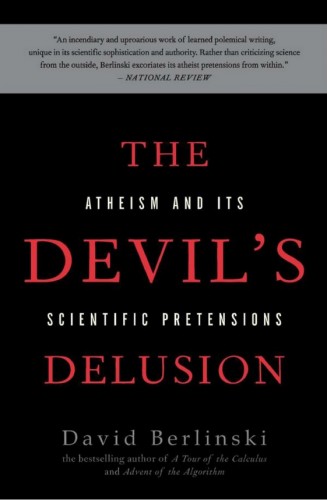
Berlinski - Devil's Delusion
Until just yesterday, it was fashionable for scientists carefully to cast their bread upon various ecclesiastical waters. Very carefully. In writing about Darwin’s God, the biologist Kenneth Miller affirmed that he saw no conflict what - soever between his own Catholic faith and Darwin’s theory of evolution. Francis Collins, who directed the Human Genome Project, has made a very similar case for his religious beliefs. Science and religion, Stephen Jay Gould re marked, constitute Non-Overlapping Magisteria. Science is a fine thing. Religion is a fine thing too. They are two very fine things. The great master of this tolerant spirit was Albert Einstein. What was it he said? “Science without religion is lame, religion without science is blind.” The lame and the blind excepted, who could object?
If scientists were unwilling to give offense to religion, perhaps from a decent sense that it was precisely their religious belief that enabled many men and women the better to endure life, they were very often equally unwilling enthusiastically to endorse its conclusions. And for the same underlying reason: Why make trouble? When the great Austrian logician Kurt Gödel devised an interesting version of the ontological argument, he showed it to friends and warned them that having created an argument in favor of God’s existence, he was not about to believe his own conclusions. He had merely been testing the limits of his intellectual power. It is something, after all, that every man might wish to know.
With the rise of what the Wall Street Journal has called “militant atheism,” both the terms of debate and the climate of opinion have changed. The sunny agnosticism character istic of men who believed that with respect to God, it could go either way, is no longer in fashion. It is regarded as rather dim.
David Berlinski - The Devil's Delusion - Atheism and Its Scientific Pretensions
Published by Basic Books,
A Member of the Perseus Books Group
ISBN: 978-0-465-01937-3
David Berlinski - The Devil's Delusion - Atheism and Its Scientific Pretensions - Contents
- Preface to the Second Edition
- Preface to the First Edition
- 1 No Gods Before Me
- 2 Nights of Doubt
- 3 Horses Do Not Fly
- 4 The Cause
- 5 The Reason
- 6 A Put-up Job
- 7 A Curious Proof That God Does Not Exist
- 8 Our Inner Ape, a Darling, and the Human Mind
- 9 Miracles in Our Time
- 10 The Cardinal and His Cathedral
- Acknowledgments
- Index
David Berlinski - The Devil's Delusion - Atheism and Its Scientific Pretensions - Horses Do Not Fly
Despite the immense ideological power that it wields, the American scientific establishment has never trusted in its victory over organized religion (or anything else, for that matter). And for obvious reasons. On crucial matters of faith and morals, their margin of victory often seems paper-thin. Members of the National Academy of Sciences are by a large majority persuaded that there is no God, men and women in their millions that there is. Thou, O king, sawest, and beheld a great image. This great image, whose brightness was excellent, stood before thee; and the form thereof was terrible. This image’s head was of fine gold, his breast and his arms of silver, his belly and his thighs of brass, His legs of iron, his feet part of iron and part of clay. Those who are religious contemplate this great image and see its head of gold; those who are not see its feet of clay. No division cuts deeper in the United States—or the world—or provokes a greater sense of mutual unease. Looking thus toward those feet of clay, Sam Harris and Christopher Hitchens observe that many religious claims do not by the light of contemporary science appear to be true. Did Muhammad fly to Jerusalem on a horse named Borak? What an idea, Hitchens writes, observing alertly that “horses cannot and do not fly.”
Addressing an audience of his Christian readers, Sam Har - ris asks them to consider the Moslem faith. He is quite certain that if they can find no reason to accept another man’s beliefs, they will be moved at once to reject their own: “Can you prove that Allah is not the one true God?” “Can you prove that the Archangel Gabriel did not visit Muhammad in his cave?”
Richard Dawkins is less concerned to reject biblical miracles than to condemn the Deity for his hurtful insensitivity.
“The God of the Old Testament,” he writes, “is arguably the most unpleasant character in all of fiction: jealous and proud of it; a petty, unjust, unforgiving control-freak; a vindictive, blood thirsty ethnic cleanser; a misogynistic, homophobic, rac ist, infanticidal, genocidal, filicidal, pestilential, megalo ma - niacal, sadomasochistic, capriciously malevolent bully.” These are, to my way of thinking, striking points in God’s favor, but opinions, I suppose, will vary.
It hardly matters. What is at issue is not so much the character of the Deity but his existence.





Комментарии
Пока нет комментариев. Будьте первым!